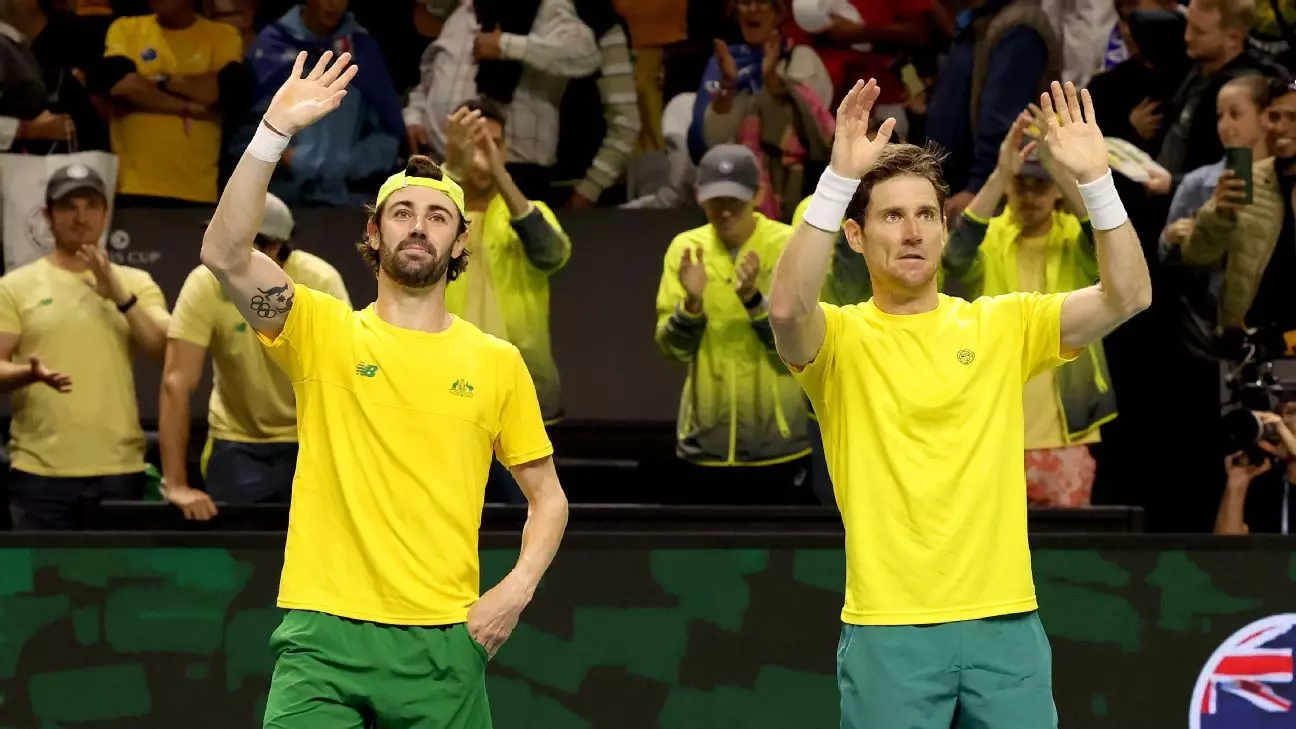In the realm of competitive sports, particularly in team formats like tennis doubles, decision-making can heavily influence the outcome of matches. A recent event during the Davis Cup quarterfinals showcased this dilemma. U.S. captain Bob Bryan, despite boasting an impressive resume with 16 Grand Slam titles and a position in the International Tennis Hall of Fame, faced a significant setback due to a risky lineup change. This decision, made at the last moment against Australia, left the American team grappling with a 17-year title drought. Bryan’s alteration not only resulted in defeat but raised questions about the wisdom of last-minute strategy shifts in high-stakes competitions.
As the U.S. faced Australia in a best-of-three quarterfinal, the competition was tight at 1-1. Traditionally, teams lean on established pairings known for their chemistry and tactical synergy, especially in doubles matches where coordination and trust are paramount. Bryan opted to replace the seasoned duo of Austin Krajicek and Rajeev Ram, silver medalists at the Paris Olympics, with singles players Tommy Paul and Ben Shelton. This move was aimed at surprising the Australians but ultimately backfired as the new pairing lost 6-4, 6-4 to Matthew Ebden and Jordan Thompson. The unexpected decision not only cost the match but also underscored the importance of coherence and experience in team dynamics.
In assessing Bryan’s rationale, it’s essential to consider the situation leading up to the match. Bryan indicated that he aimed to catch the Australian team off guard. However, Australian captain Lleyton Hewitt’s reaction implied that the decision lacked the element of surprise, as he noted his team’s awareness of Paul and Shelton’s training activities throughout the week. The U.S. captain justified his decision by highlighting that Ebden had previously dominated the established duo and suggesting that Shelton’s singles match earlier in the day might have put him in a competitive mindset. Such reasoning raises critical points regarding analytical strategies in sports. While analytics can provide valuable insights, relying on instinct and team familiarity often outweighs the statistical probabilities.
The U.S. men’s tennis team, once a dominant force in the Davis Cup with a record 32 championships, now finds itself on a lengthy title drought, the last victory occurring in 2007. Current statistics reveal that the American team has not reached the semifinals since 2018, suggesting a deeper issue than just isolated match decisions. The evolving landscape of international tennis, with emerging players and nations investing significantly in the sport, poses a formidable challenge. For U.S. tennis to reclaim its former glory, it needs not only to hone leadership decisions but also to foster a culture where emerging talent gets adequate doubles experience and training.
In retrospect, Bryan’s choice reflects a broader message applicable to any team sport: last-minute decisions should be cautiously approached, especially in critical matches. While the analytics behind player performance and synergy are crucial, they must be evaluated alongside the historical context of team interactions and partnerships. The case of Paul and Shelton stands as a cautionary tale: while both players have shone in singles competitions, their lack of doubles experience together rendered them vulnerable against seasoned opponents.
As the U.S. Davis Cup team reflects on this setback, it must consider how future decisions can be made with a balance of statistical analysis and experiential knowledge of team dynamics. With the potential for fresh strategies and renewed approaches, American tennis could pave the way for its renaissance. Decisions made under pressure will ultimately define their journey in the competitive landscape of international tennis, but a return to established partnerships and a deeper understanding of team synergy may be the key to breaking the longstanding title drought. In sports, as in life, teamwork and understanding often prevail over surprises and single-match gambles.


Leave a Reply